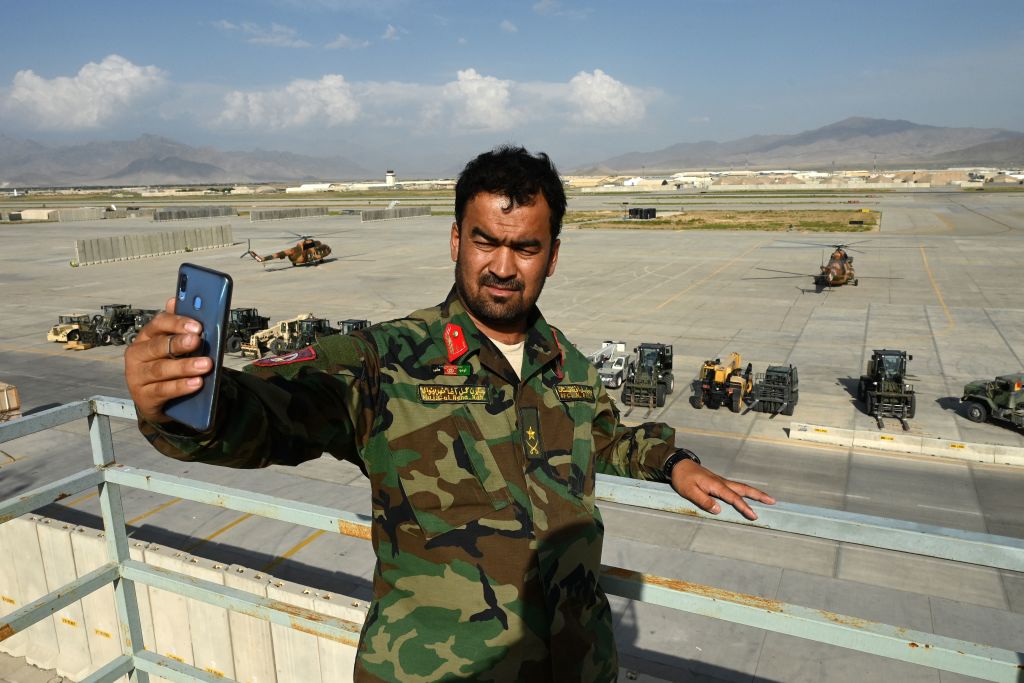The U.S. exit from Afghanistan is 90 percent complete, Pentagon says. Here's why the last 10 percent are still there.


A free daily email with the biggest news stories of the day – and the best features from TheWeek.com
You are now subscribed
Your newsletter sign-up was successful
The Pentagon announced Tuesday that the U.S. military has completed 90 percent of its withdrawal from Afghanistan, and the remaining 10 percent will be completed by the end of August, soon before President Biden's Sept. 11 deadline. The U.S. departure after nearly 20 years in Afghanistan has been swift and quiet, as epitomized by the unheralded handover of Bagram Air Base to Afghan forces last week.
So "why is the last 10 percent going to take until the end of August?" Politico's Lara Seligman asked on Twitter. By Tuesday evening, she had some answers for Politico's Nightly newsletter.
First, Seligman reports, U.S. military leaders "don't want to announce that the withdrawal has already effectively been completed for fear that the Taliban will use that news as an excuse to launch an even stronger offensive," and "they want to keep some contractors around as long as possible to help out the Afghans" protecting Kabul, its airport, and the crew maintaining the country's air force. Having the U.S. commander in country gives "at least the illusion of a U.S. military presence," and might help keep up the morale of the Afghan National Security Forces, the only thing that will prevent Kabul falling to the Taliban, Seligman adds.
The Week
Escape your echo chamber. Get the facts behind the news, plus analysis from multiple perspectives.

Sign up for The Week's Free Newsletters
From our morning news briefing to a weekly Good News Newsletter, get the best of The Week delivered directly to your inbox.
From our morning news briefing to a weekly Good News Newsletter, get the best of The Week delivered directly to your inbox.
And finally, keeping a U.S. military presence in Afghanistan over the summer "gives the administration more time to finalize plans to relocate thousands of Afghans who helped the U.S. military as interpreters" and in other supporting roles and "are in danger of being killed by the Taliban after the U.S. officially leaves," Seligman reports. These Afghans are currently awaiting special immigration visas.
As U.S. forces withdraw, the Taliban is grabbing up territory and imposing its strict version of Islam, which forbids music, women working in public-facing jobs, and girls in school, The New York Times reports. It will be "terrible" to watch the Taliban gobble up Afghanistan again, The Week's Joel Mathis writes, though "it is time to leave."
Biden's decision to exit Afghanistan is broadly popular, even among Republican voters — former President Donald Trump set the stage for withdrawal, after all — and a diverse group of war veterans, "many of whom had clashed bitter with one another over the years," has pledged to continue providing Biden political cover if the Taliban prevails, the Times reports.
A free daily email with the biggest news stories of the day – and the best features from TheWeek.com
Peter has worked as a news and culture writer and editor at The Week since the site's launch in 2008. He covers politics, world affairs, religion and cultural currents. His journalism career began as a copy editor at a financial newswire and has included editorial positions at The New York Times Magazine, Facts on File, and Oregon State University.
-
 What to know before filing your own taxes for the first time
What to know before filing your own taxes for the first timethe explainer Tackle this financial milestone with confidence
-
 The biggest box office flops of the 21st century
The biggest box office flops of the 21st centuryin depth Unnecessary remakes and turgid, expensive CGI-fests highlight this list of these most notorious box-office losers
-
 The 10 most infamous abductions in modern history
The 10 most infamous abductions in modern historyin depth The taking of Savannah Guthrie’s mother, Nancy, is the latest in a long string of high-profile kidnappings
-
 Operation Rubific: the government's secret Afghan relocation scheme
Operation Rubific: the government's secret Afghan relocation schemeThe Explainer Massive data leak a 'national embarrassment' that has ended up costing taxpayer billions
-
 British warship repels 'largest Houthi attack to date' in the Red Sea
British warship repels 'largest Houthi attack to date' in the Red SeaSpeed read Western allies warn of military response to Iranian-backed Yemeni rebels if attacks on ships continue
-
 Houthi rebels claim Red Sea ship attacks
Houthi rebels claim Red Sea ship attacksspeed read Iran-backed Yemeni group vows to escalate aggression towards Israel-linked vessels in revenge for Gaza war
-
 Israel plans next phase of Gaza war as first hostages released
Israel plans next phase of Gaza war as first hostages releasedSpeed read After four-day ceasefire 'we will not stop' until destruction of Hamas, says Israel
-
 Mob storms Russian airport 'looking for Jews'
Mob storms Russian airport 'looking for Jews'Speed Read Plane from Israel surrounded by rioters chanting antisemitic slogans after landing in Russia's Dagestan region
-
 Tuberville's military promotions block is upending lives, combat readiness, 3 military branch chiefs say
Tuberville's military promotions block is upending lives, combat readiness, 3 military branch chiefs saySpeed Read
-
 Ukraine's counteroffensive is making incremental gains. Does it matter in the broader war?
Ukraine's counteroffensive is making incremental gains. Does it matter in the broader war?Speed Read
-
 US commissions first-ever Navy ship in a foreign port
US commissions first-ever Navy ship in a foreign portSpeed Read
